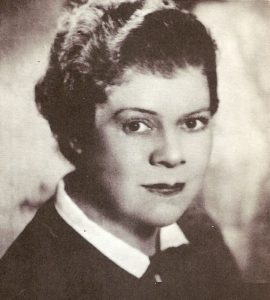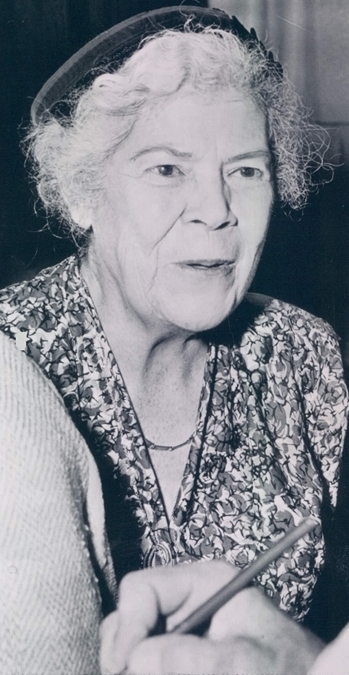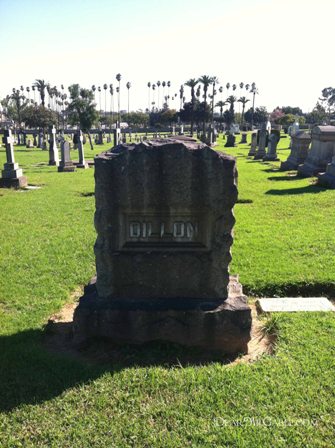Josephine Dillon

Stats
Born January 26, 1884 in Denver, Colorado. One of six children (one brother and four sisters) born to Henry Clay and Florence Hood Dillon.
5’5, brunette, brown-eyed
Quotes
“What went on in Clark’s mind that did not concern acting, I do not know, have never known, and will never know–now. What did I think about when we were not talking about his acting, or his career? He never knew, and I have never known whether he ever wondered or cared. As for myself, I put in very little time resenting his silences, or in suspicions of possible other women–but I was often very lonely. Perhaps he was too.”
“Clark Gable had the furrowed forehead of a man who was overworked and under nourished. He had the straight lipped, set mouth of the do it or die character. He had the narrow, slit-eyed expression of the man who has had to fight things through alone, and who tells nothing.”
“[The marriage] was not fun to watch and not fun to live through.”

Before Clark
The Dillon family moved to Long Beach, California in 1889 and then to Los Angeles in 1906. Josephine (called “Joe” by her family) was a dedicated student and graduated from Stanford University in 1908, one of the few women to be admitted at that time, let alone graduate. She decided she wanted to be an actress and had a few promising parts in plays but was repeatedly told she didn’t have the “star power” to be a successful actress. So, she decided to turn to drama coaching. She went to Europe and studied teaching, then to New York, where she met a singing coach and followed her to Portland in 1923 to set up a studio.
How They Met
One story is that they met when Clark, then a telephone lineman in Portland, went to her office to fix her phone. Another is that he enrolled in her theatre coaching class in Portland and became her star pupil. Either way, Josephine took an instant liking to the ambitious young actor and began to groom Clark for stardom.
Wedding Day
After mutually deciding that marriage was the only way the two of them could move to Hollywood together, Josephine and Clark were married on December 13, 1924. He was 23, she was 41. One of her friends threw them a party afterward, which Clark spent dancing with a wealthy buxom blonde while Josephine fumed. After the party, they walked home together in silence and when they reached home, Clark tipped his hat to her, said good night and went to bed, alone.
 Married Life
Married Life
Clark and Josephine scraped by on just a few cents a week. Any excess after rent and food was given to Clark so he could go to the movies. If enough was left over, Josephine might accompany him. Through her connections, she got him parts in plays and bit parts in movies. It seemed with the introduction of any attractive new costar, he started staying away longer and longer, not coming home for days at a time and offering no explanation when he did return. After a few bit parts, Clark decided to join a stock company in Houston. He soon grew embarrassed of his matronly wife, who sat front and center at all his performances and would go back to his dressing room to critique him between scenes. She was also very jealous and possessive. He finally told her to stop coming and stopped speaking to her altogether. This frustrated Josephine–she tried to attend one of his play rehearsals and was turned away at the door. Afterward, she claims, “He phoned me and said to keep out of his life and that he was through with me. I told him I was going back to California and that he’d better become the best actor he could because he would never be a man.” Josephine and Clark both say the marriage was never consummated and was always intended to be in name only. A few people close to Josephine however, say that she was in love with him and carried a torch for him all her life. She even kept a trunk filled with pictures and newspaper clippings of him.
Divorce
Josephine grew increasingly bitter when Clark was being escorted around town by rich socialite Ria Franklin. Ria was doing far more for him than Josephine could: throwing money at him, buying him clothes, paying to have his crooked teeth fixed, introducing her to her rich friends. Ria was insisting on marriage so Clark wanted Josephine to go to Mexico for a quickie divorce. She refused. She instead filed for divorce in California, citing “desertion”, knowing full well that the year-long wait period would frustrate Clark and Ria. The divorce became final on April 1, 1930. In August of 1931, after Clark had married Ria and he was quickly becoming a rising star at MGM, Josephine sent a letter to Louis B. Mayer and said that Clark was “an ungrateful chiseler” who used her to become a star and then deserted her. She said that he left her in financial ruins and unless MGM provided some financial assistance, she would write the story of their marriage and auction it off to the newspapers and magazines. Without consulting Clark, Mayer set up to have $200 a month taken out of Clark’s paycheck and sent directly to Josephine. This infuriated Clark and caused the first of many rifts in his relationship with Mayer.

Life After Clark
Josephine spent the remainder of her life as a poor drama coach. Late in her life, she wrote a (still unpublished) manuscript detailing her marriage to Clark, calling him “Mark” and herself “Julia”, but it was obvious whom the characters were meant to be. When the mood struck her, she would sell her story to a tabloid complete with pictures of her living in her ramshackle converted barn. She spoke very bitterly about Clark (see The Article Archive–“The Wife Clark Gable Forgot”) and declared that Clark had abandoned her and was ungrateful and selfish. One detail the articles failed to mention was that Clark owned the house she lived in and let her live there rent-free for all of her life. He left the house to her in his will. There were no provisions for any of his other ex-wives.
Josephine died of pneumonia on November 10, 1971. She is buried in New Calvary Catholic Cemetery in Los Angeles. She is in the Dillon family plot and does not have an individual marker.
* For more pictures, check out the Josephine Dillon section in the gallery.
* As far as I know no pictures exist of Josephine and Clark together.
6 Comments
Mari
Miss Dillon was actually a very accomplished stage actress who appeared in many plays as the lead actress. Some articles i’ve read describe her as a poor acting coach,but this isn’t true. In the play ” The dawn of tomorrow” which ran in 1913 an article in the Tacoma times states” she has amazed other members of her company with her fine interpretation of the part”. Another article describes her as an exceptionally talented young actress with a charming personality.
Maryann Robles
Unfortunately she could not see that she was a mother firgure to this man…at least he let her stay in that house rent free…I sense feelings of guilt on his part…tragic!
Pogo
Life is what happens while we are busy making plans. A wise person said this or close to it some time ago. You can’t make anyone love you, but sometimes there are many many other feelings more significant as well as less significant than love. And love can occur in various forms. The interplay as well as the characters of those involved dictate the narrative of this truly human story.
Bethune
Clark Gable and Miss Dillon was not to be, both were great people in there own way however I am sure he knew that it was her that made him a great actor. Love all of the old movies from the forties and fifties, hope they will not be forgotten.
David R
Interesting trivia: Josephine’s father was a proninent lawyer who served a term as Los Angeles District Attorney.
Kimberly
I loved clark gable but its obvious he used his first two wives for his own personal gain .sadly he found real love with this 3rd wife Carole Lombard who parished in a airplane crash . I loved them as a couple, but some say that was his karma.